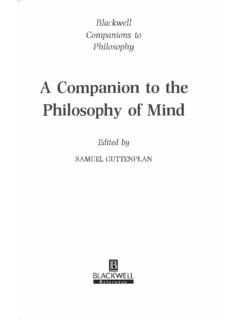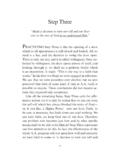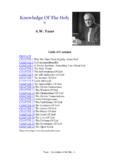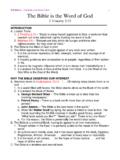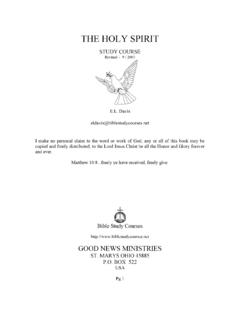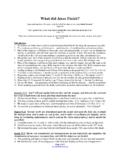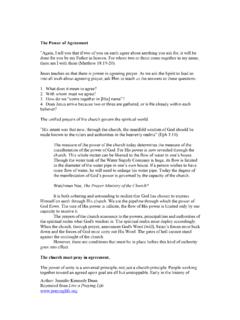Transcription of WHY IS THERE ANYTHING AT ALL? Peter van …
1 WHY IS THERE ANYTHING AT ALL? Peter van Inwagen and E. J. Lowe I- Peter van Inwagen T he question that is my title is supposed to be the most profound and difficult of all questions. Some, indeed, have said that it is a dangerous question, a question that can tear the mind asunder. But I think we can make some progress with it if we do not panic. Let us begin by asking what would count as an answer to it. One sort of answer, the best if we could get it, would consist in a demonstration that it was impossible for THERE to be Or so I would suppose: if showing that it is impossible for a certain state of affairs to obtain doesn't count as answering the question why that state of affairs does not obtain, I don't know what would count. How would one go about proving that it was impossible for THERE to be nothing ? One way would be to prove the existence of a necessary being. By a 'being' I mean a concrete object-whatever that may mean-and, therefore, by a necessary being I mean a necessarily existent concrete object.
2 I will assume that at least some abstract objects-numbers, pure sets, 'purely qualitative' properties and relations, possibilities, possible worlds themselves -exist in all possible worlds. I do not think that the question that people have actually intended to ask when they ask why ANYTHING at all should exist could be answered by pointing out-I will take 1. Most of the arguments of this paper will be modal arguments of one sort or another. In presenting these arguments, I am going to assume that David Lewis's metaphysics of modality-'Genuine Modal Realism'-is wrong, and that the 'abstractionist' modal metaphysic of Kripke and Plantinga and Stalnaker is right. Problems about the validity and cogency of modal reasoning are normally not particularly sensitive to how one answers the question whether possible worlds are what Lewis says they are or what his opponents say they are. The arguments we shall be considering, however, are exceptions to this general- ization.
3 The question 'Why should THERE be ANYTHING at all?' looks very different when viewed from the perspective provided by Lewis and from the perspective provided by Kripke et al. I am sorry to have to begin this paper by simply assuming without argument that Lewis is wrong about the metaphysics of modality, but I can't address every question in one paper. I discuss Lewis's 'Genuine Modal Realism' in 'Two Concepts of Possible Worlds', Midwest Studies in Philosophy 11 (1986) pp. 185-213. 96 I-- Peter VAN INWAGEN this statement to be true for the sake of the illustration; I certainly think it's true-that the number 510 would exist no matter what. If the notion of an abstract object makes sense at all, it seems evident that if everything were an abstract object, if the only objects were abstract objects, THERE is an obvious and perfectly good sense in which THERE would be nothing at all, for THERE would be no physical things, no stuffs, no events, no space, no time, no Cartesian egos, no When people want to know why THERE is ANYTHING at all, they want to know why that bleak state of affairs does not obtain.
4 It is by no means a trivial assertion that a demonstration of the impossibility of THERE being nothing must take the form of a demonstration that THERE is a necessary being. If one could do it, it would certainly suffice to show that it was a necessary truth that THERE were some beings, and that proposition does not formally entail the proposition that THERE is a necessary being. (It might be that THERE is at least one being in every possible world, even if THERE is no being that exists in every possible world.) I can say only that it seems to me hopeless to try to devise any argument for the conclusion that it is a necessary truth that THERE are beings that is not also an argument for the conclusion that THERE is a necessary being. I simply have no idea of how one might even attempt that. It is at any rate true that showing that THERE is a necessary being would do the trick: if THERE is a necessary being then it is impossible for THERE to be nothing . But can it be done?
5 Is it possible to show that THERE is a necessary being? The friends of the ontological argument (if THERE are any) will no doubt remind us that showing that THERE is a necessary being is just what their argument claims to be particularly good at. Let us see whether the ontological argument can help us with our question. Of all the versions of the ontological argument, the 2. Suppose THERE were pure stuffs: stuffs whose presence in a region of space did not require any being to be wholly or partly present in that region. (Butter would be a pure stuff if butter existed but, (i) nothing was made of butter, and (ii) some regions of space were filled with butter without THERE being any quarks, electrons, atoms, or other concrete things in those regions.) Then it would be possible for THERE to be no beings-and yet not nothing . Or suppose that THERE were pure events: events whose occurrence did not consist in a change in the intrinsic properties of any being or a change in the external relations that held among two or more beings.
6 Then, again, it would be possible for THERE to be no beings-and yet not nothing . In my view, however, pure stuffs and events are metaphysically impossible . If I were to be convinced otherwise, certain aspects of the language of this paper would have to be revised, but not, I think, in any way that affected any of its central theses. WHY IS THERE ANYTHING AT ALL? 97 version I have called the Minimal Modal Ontological Argument is the one that can be most profitably studied by the philosopher who wants an argument whose conclusion is the existence of a necessary being. (The argument is indisputably logically valid; it has just the desired conclusion; every other version of the ontological argument that is indisputably logically valid will have a premise or premises that it would be harder to defend than the premise of the Minimal Modal Argument.) The argument is easy to state: Consider the two properties, necessity (that is, necessary existence or existence in all possible worlds) and entity or concrescence (the property of being a being or concrete object).
7 These two properties are compatible-it is not absolutely or metaphysically or intrinsically impossible for something to have both of them. Therefore, THERE is some- thing that has both of them; that is, THERE is a necessary But why should we accept the premise of the argument-that necessity and entity are compatible? I know of only one argument for the compatibility of these two properties that is even superficially plausible. This argument is a version of the cosmological argument. It has three premises: Every fact has an explanation; If a property F has, as a matter of contingent fact, a non-empty extension, then any explanation of this fact must somehow involve beings (concrete things) that do not have F; Contingency (the property of being a contingent being) has, as a matter of contingent fact, a non-empty extension. It obviously follows from these three premises that if THERE are, as a matter of contingent fact, contingent beings, THERE are also non- contingent beings-that is, necessary beings.
8 But we know by observation that THERE are beings, and every being is either contingent or necessary. If, therefore, this version of the cosmological argument is sound, the observed fact that THERE are 3. For a discussion of the Minimal Modal Ontological Argument, a discussion that includes a demonstration of its validity, see my 'Ontological Arguments', Noas 11 (1977) pp. 375- 395. This essay is reprinted in Peter van Inwagen, God, Knowledge, and Mystery: Essays in Philosophical Theology (Ithaca, : Cornell University Press, 1995). 98 I- Peter VAN INWAGEN beings entails that THERE is at least one necessary being, and hence entails that it is impossible for THERE to be nothing . (This conclusion depends on our assumption that if THERE are contingent beings this state of affairs obtains only as a matter of contingent fact. But if THERE were contingent beings of necessity, it would also follow that it was impossible for THERE to be nothing .) We can, in fact, reach this conclusion without any appeal to observation.
9 We can show that it is impossible for THERE to be nothing without using any observed fact as a premise, even the fact that THERE are some beings. If the first two premises of our argument are true at all, then, surely, they are necessarily true, and the argument is therefore sound in any world in which it is a contingent truth that THERE are contingent beings. Therefore, if our first two premises are true, and if the existence of beings, any beings at all, beings of any sort, is a possible state of affairs, then it is possible for THERE to be a necessary being-that is to say, necessity and entity are compatible properties. And, as we have learned from our examination of the Minimal Modal Ontological Argument, if necessity and entity are compatible properties, THERE is a necessary being. Therefore, if the first two premises of our version of the cosmological argument are true, it is a necessary truth that THERE are beings if THERE could be beings. In other words, given that the first two premises of our version of the cosmological argument are true, it is possible for THERE not to be ANYTHING only if it is impossible for THERE to be ANYTHING .
10 And one could hardly be expected to do better with the question 'Why is THERE ANYTHING at all?' than to establish this conclusion. Unfortunately, however, we have not established this conclusion. We have failed to establish it because the first premise of our cosmological argument-a variant on the Principle of Sufficient Reason: that every fact has an explanation-is wholly unbelievable. It is unbelievable because it has an absurd consequence: that all truths are necessary truths. Or so, at least, it seems to me, and so I have argued elsewhere. The general form of my argument was this: Suppose 'Alpha' is a proper name of the actual world; if every fact has an explanation, the fact that Alpha is actual has an explanation; but if this fact has an explanation, then every truth is a necessary 4. For a demonstration, see my Metaphysics (London: Oxford University Press, 1993), pp. 104-107. WHY IS THERE ANYTHING AT ALL? 99 In my judgment, THERE is no known argument that can plausibly be said to show that THERE is a necessary being, and THERE is therefore no known argument that can plausibly be said to show that it is impossible for THERE to be nothing .

